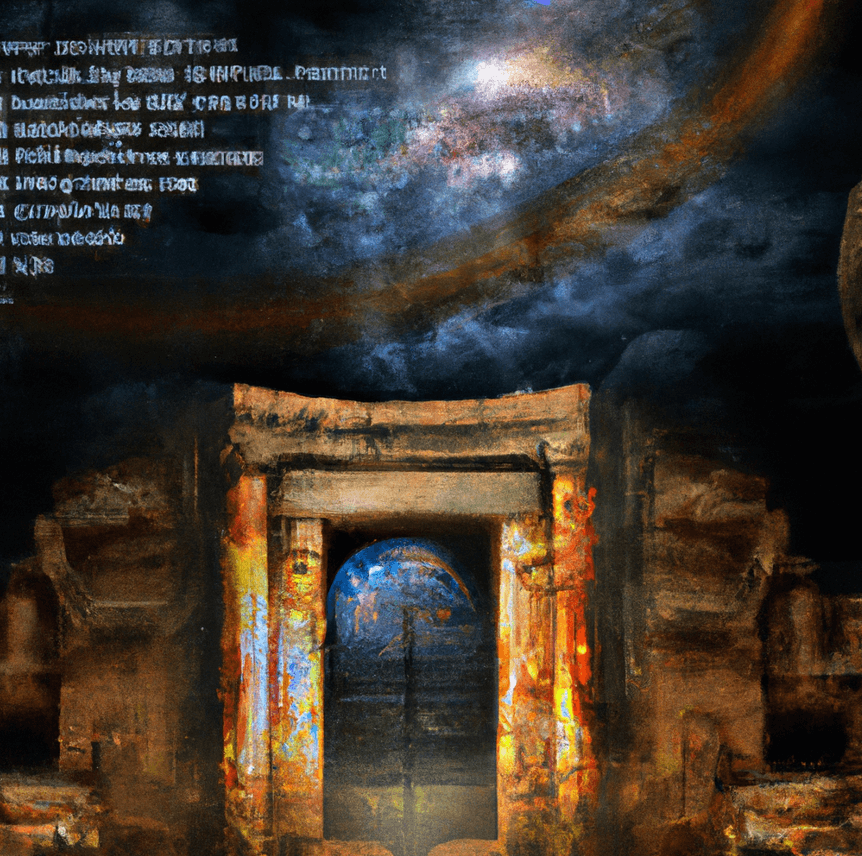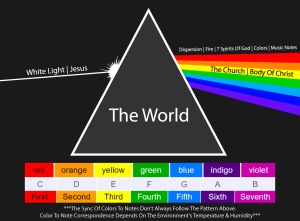Rebuild The Ancient Ruins In Modern Day America
In the context of (Isaiah 61:4) and (Ezekiel 36:33-36), the phrase “rebuild the ancient ruins” has both a literal and a symbolic meaning. In both passages, the authors describe a time of restoration and renewal for the people of Israel after a period of desolation, corruption of leadership throughout all aspects their society leading to injustice and suffering.
After the death burial and resurrection of Jesus Christ these passages now speak to us. Just like it has spoken to previous periods in history leading up to modern day and will speak to future periods of time to come.
God Rebuilding The Ancient Ruins Has Personal, Societal & Global Benefits:
- Restoration of faith and reverence in God (Isaiah 61:4): Rebuilding ancient ruins strengthens people’s belief in God and His divine power, leading to a more spiritually connected society.
- Promotion of justice, righteousness, and compassion (Psalm 33:5): As ancient ruins are rebuilt, society will be guided by these core biblical principles, resulting in fair and equitable treatment for all.
- Healing for individuals and communities (Isaiah 61:3): Rebuilding ancient ruins helps heal emotional, psychological, and spiritual wounds, fostering personal and communal growth.
- Renewed sense of purpose and unity (Ephesians 4:3): Working together to rebuild ancient ruins fosters unity and collaboration, inspiring individuals to pursue a common purpose.
- Preservation of cultural and historical heritage (Nehemiah 2:5): Rebuilding ancient ruins preserves invaluable cultural and historical legacies, providing a link to the past and enriching future generations.
- Economic revitalization (Haggai 1:8): Rebuilding ancient ruins can spur economic growth, creating jobs and opportunities for local communities.
- Environmental benefits (Genesis 2:15): The responsible rebuilding of ancient ruins can promote sustainable development and stewardship of natural resources.
- Strengthening of the family unit (Deuteronomy 6:7): As communities work together to rebuild ancient ruins, family bonds can be reinforced and the importance of family values emphasized.
- Encouragement of repentance and spiritual growth (2 Peter 3:9): Witnessing the transformative power of God in rebuilding ancient ruins can inspire individuals to seek redemption, repentance, and spiritual growth.
- Global impact (Matthew 28:19): The rebuilding of ancient ruins can serve as a powerful testimony to the love and mercy of God, inspiring people across the world to embrace biblical principles and work towards a more just, compassionate, and righteous society.
Ancient & Modern Parallels
Drawing parallels between the moral decline and corruption described in the book of Ezekiel and the challenges faced in contemporary American society, it is important to recognize that the Bible serves as the ultimate authority. Ezekiel offers a powerful and relevant message for today’s world, highlighting the consequences of corruption, perversion, and the abuse of power by corrupt parents, freind groups, husbands, wives & religious/political leaders.
Ezekiel condemns the leaders of his time for their failure to uphold God’s law, for engaging in idolatry, and for exploiting the vulnerable. This condemnation can be seen as a warning to those in power in modern society, who may also be guilty of moral corruption and deception. In both cases, God holds the religious and political elites accountable for their actions and calls for justice and righteousness to prevail.
God will judge the 21st century through Ezekiel archetypes and forgive through the blood of Jesus.
As we consider the prophetic message of Ezekiel, it is crucial to understand that God has the power to displace corrupt leaders and replace them with individuals who will act with integrity and compassion. From the highest office of the President to the heads of households, God can raise up new leaders who will guide society toward justice, equality, and moral responsibility. These leaders will work to rebuild the “ancient ruins,” restoring the spiritual and ethical foundations of society that have been devastated by corruption and moral decay that manifests in family relationships, friends, groups, clubs, religious settings and political settings.
This is not replacement theology. Israel is an example for all believers through the ages (past future & present).
Indeed, Israel serves as an example for believers, as highlighted in 1 Corinthians 10:11. This verse emphasizes that the experiences of the Israelites were recorded as lessons for believers & societies to learn from, by guided by & apply in their own lives and policies.
Using Israel’s history as an example, believers can glean valuable insights into faith, obedience, and the consequences of disobedience. Through these lessons, Christians & societies can better understand the importance of staying true to God’s commandments and living a life that honors Him.
By recognizing Israel’s role as an example, believers & societies can grow in their spiritual journey & growth. Drawing from the experiences and wisdom of the Israelites’ history leads to relevant lessons and guidance for all of us today. Resulting in and understanding of God’s will and purpose for our lives.
It is important to note that the points mentioned previously are not promoting replacement theology. Instead, they highlight how Israel serves as an example for all believers throughout history (past, present, and future). The experiences and lessons learned from Israel can offer valuable insights for people of faith in various contexts.
Believe & Enter Rest So God Can Work & Rebuild The Ancient Ruins
In Hebrews 4, the author emphasizes the importance of faith and obedience, drawing on the example of the Israelites who were unable to enter God’s rest due to their disobedience and unbelief. By learning from Israel’s example, believers through all ages can remain faithful and obedient to God, thus experiencing the rest and peace that He promises.
So, the ideas presented are not about replacing Israel or its significance in God’s plan. Rather, they highlight the valuable lessons that can be drawn from Israel’s experiences, applicable to believers in all times and places, fostering a deeper understanding and connection to God’s word and His divine plan.
Addressing the Heart of Corruption Before Rebuilding the Ancient Ruins
Before we God can rebuild the ancient ruins though humanity, it is crucial to address the pervasive corruption and bad leadership that permeates all aspects of society today just like it did Israel. This article aims to dive deeper into the thoughts and intentions of the human heart, focusing on individuals who may appear righteous outwardly, but harbor darkness within. Jesus Himself warned against such hypocrisy when He said that even looking at a woman with lust is akin to committing adultery, and hating one’s brother without cause is equal to murder Matthew 5:28, 1 John 3:15.
Everyone is guilty but we all must carry our cross and strive to be better by being honest & letting God change us.
By exposing deceptive and manipulative behaviors, such as gaslighting & manipulation, we can begin to confront and dismantle the corrupt systems that hinder the restoration of the ancient ruins. This process requires honesty, introspection, and a commitment to living by biblical principles, recognizing that the Bible is the ultimate authority, not man or AI.
Change starts within each individual, as we genuinely repent and seek forgiveness for our hidden sins of the heart and mind Acts 3:19. As more people acknowledge their shortcomings and strive to follow God’s teachings, a ripple effect will occur, transforming the hearts and minds of society as a whole.
The process may be challenging and uncomfortable, but it is a necessary step toward healing and rebuilding. As we remove the rot that lies beneath the surface, the foundation for rebuilding the ancient ruins will become stronger, resulting in a society that reflects the values of justice, compassion, and righteousness.
We must first address the corruption and bad leadership that exist within the hearts of individuals before the ancient ruins can be rebuilt. By exposing hidden sins and embracing the transformative power of repentance and forgiveness, we can create a more just and righteous world, reflecting the love and mercy of our Creator.
Corrupt Patterns Exist Among Family, Friends, Parents & Religious/Political Leaders
Family:
One of the most destructive forces within families can be rivalry, which often stems from favoritism and the desire to pass on the family name or seed. This competition for attention and validation can lead to selfishness, corruption, and the breakdown of family bonds. Such behavior contradicts the biblical teachings of love, compassion, and unity 1 Corinthians 13:4-7.
When family members are pitted against one another, they resort to manipulation, gaslighting deceit, and underhanded tactics in order to gain the upper hand, looking good on the outside while demonizing their family rival. These actions can cause deep emotional wounds and lasting psychological damage. It is essential to recognize the dangers of family rivalry and strive to create an environment where each family member is valued and supported equally.
Husbands & Wives:
Deceptive behaviors that can pervade marriages. Some wives might belittle and control their husbands due to personal insecurities, a disturbing reality that mirrors the adulteress’ actions in Ezekiel 23. Such actions not only harm relationships but also contradict biblical teachings such as those in Revelation 2:20.
These patterns follow the exact corruption of the Biden administration.
USA is falling apart because of this dynamic.
Friends:
In today’s world, we witness numerous examples of bad leadership among friends that not only impact individuals but also society as a whole. It is crucial to recognize the influence of corrupt friends, groups & clubs that have detrimental effects on the lives of those they associate with. Friend groups often have an individual who sets the tone and makes decisions for the group. Unfortunately, some of these leaders manipulate and divide people within the group, seeking more power and influence. They may even engage in adulterous relationships, gossip, gaslghting & deformation in order to instill jealousy and promote their domination while ostracizing and downplaying others in the group (Proverbs 6:32).
Parents:
In today’s society, we see numerous examples of problematic religious and political leaders. Corrupt parents follow the same exact patterns. For instance, corrupt parents who sacrifice their children’s well-being and future by engaging in manipulative, domineering, and belittling behaviors have caused untold trauma and lifelong psychological issues. These parents not only include those who advocate for abortion and gender confusion (that’s too obvious of a a problem to judge and address in this article) but rather many parents seem good, responsible & maybe go to church on Sunday, but they in reality perpetuate cycles of emotional and spiritual abuse, manipulation, gaslighting, sexualization, molestation & ostracization to their children & get away with it through domination and gaslighting. Drawing from the ultimate authority of the Bible, it is evident that these individuals have strayed from the path of righteousness, and their actions have far-reaching consequences.
Religious & Political Leaders:
Similarly, corrupt political and religious leaders exploit their positions of power to manipulate the masses and protect immoral actions. They promote destructive policies like abortion turning a blind eye & even promoting the sins that undermine the moral fabric of society. These leaders have lost sight of their duty to uphold justice, compassion, and righteousness, as taught by the Bible. Their actions sow discord and suffering, leaving communities in turmoil and despair.
Religious leaders include cult leaders, and these political leaders include people like Joe Biden but those examples too obvious of a a problem to judge and address in this article, let’s rather focus on the corrupt leaders that seem good and say all of the “right things” but in reality are corrupt. The obviously corrupt ones operate in the same patterns as the seemingly good one, the only difference is they are on a different part of the spectrum and/or are better at playing the game.
However, it is crucial to remember that, through the Grace of God, redemption is possible for both the victims and the perpetrators of such corruption. By acknowledging their sins and seeking forgiveness, individuals can embark on a path of healing and spiritual renewal. In this journey, they may find the strength to challenge the status quo, confront their own shortcomings, and work towards the betterment of themselves and their communities.
Let’s Rebuild The Ancient Ruins
As we strive to address the moral decay and the domineering gaslighting that pervades our society, let us not shy away from the harsh truths presented by the Bible. Instead, let us embrace its teachings, allowing them to guide us in our pursuit of justice, righteousness, and compassion. By doing so, we can “rebuild the ancient ruins” of our spiritual and ethical foundations, fostering a society that is truly reflective of God’s love and mercy.
But first we must address the problems at their root.
Why do family members do this to one another?
The bitter truth is that rivalries, driven by the desire for dominance and the privilege of carrying on the family name, can lead to corruption, ostracization, deceit, and gaslighting. Such dysfunction is deeply rooted in the sinful nature of humanity, as the Bible has repeatedly warned us James 4:1.
Indeed, the destructive consequences of family feuds are evident in biblical accounts such as the story of Cain and Abel Genesis 4:8, where jealousy led to the first murder in human history. This tragic example serves as a stark reminder that unchecked envy and strife within families can result in disastrous outcomes.
However, the Bible also offers hope and guidance for healing these rifts. Through repentance and forgiveness, family members can find reconciliation and restoration in God’s boundless love Colossians 3:13. By embracing biblical principles, families can overcome the destructive forces of jealousy, deceit, and rivalry that often tear them apart.
Ultimately, the key to mending broken family relationships is to turn to the ultimate authority: the Bible. By placing our faith in God’s teachings, we can find the strength and wisdom needed to resist the temptations of envy, deceit, and manipulation. Instead of perpetuating destructive patterns, we can choose to foster love, compassion, and forgiveness within our families.
To overcome the pain and damage caused by family rivalries and corruption, we must look to the Bible for guidance and direction. By recognizing the destructive nature of our actions and embracing the transformative power of God’s love, we can work together to create harmonious, supportive, and loving family environments, where every member is valued and cherished.
“Why Would Husbands do this to their Wives and Why Would Wives do this to Their Husbands?”
Deceptive behaviors can be deeply ingrained, and their roots aren’t always discernible at first glance. Wives, for instance, can fall into the trap of controlling and belittling their husbands, fueled by their own insecurities. This heartbreaking reality mirrors the disdain the adulteress shows towards her spouse, as depicted in Ezekiel 23. These actions are not only damaging to relationships, but they also stand in stark contrast to the biblical teachings that condemn such behavior, as seen in Revelation 2:20.
On the other hand, husbands, too, have been known to misuse the spiritual authority bestowed upon them. As highlighted in Ephesians 5:23, they are meant to lead with love, but some turn it into a tool for manipulation and control. These men become hyper-vigilant, mistrustful, and isolate their wives, fearing outside influences. This toxic dynamic can lead to a form of Stockholm Syndrome, where the wife tragically defends her oppressor.
In conclusion, our ultimate guide should always be love and mutual respect, as directed in Ephesians 4:2-3. It’s crucial to reject these corrupt practices, uphold biblical values, and strive for healthier relationships.
Why Would People Do This to their Own Friends & Groups?
A pressing question often arises when examining the actions of group leaders, friend leaders, and club leaders: why would they betray and manipulate their own friends and members? The answer, deeply rooted in human nature, can be traced back to their hunger for power and their fear of losing control. These leaders feel threatened by others who also have a purpose within the group, and their insecurities drive them to divide, cheat, and ostracize people in order to maintain their dominance (James 4:1-2).
The Bible, as the ultimate authority on morality and human behavior, offers insights into why individuals succumb to such selfish tendencies. In Proverbs 16:18, it warns against the perils of pride and arrogance, which can lead people to disregard the well-being of others in pursuit of their own interests. Additionally, Jesus taught that we should treat others as we would like to be treated, emphasizing the importance of empathy and compassion (Matthew 7:12).
Nevertheless, there is hope for those who recognize their wrongdoings and seek redemption. Through genuine repentance and a commitment to living according to God’s teachings, even the most misguided leaders can find forgiveness and transformation (1 John 1:9). By turning away from their selfish pursuits and embracing a life of humility and selflessness, they can begin to repair the damage inflicted upon their friends and members (Philippians 2:3-4).
It is vital that we understand the motivations behind the harmful actions of group leaders, friend leaders, and club leaders. By acknowledging the Bible’s authority and applying its teachings, we can work together to create a society where friendships and group dynamics are based on mutual respect, understanding, and love (Colossians 3:12-14). As we embrace the transformative power of God’s grace, we can overcome the challenges posed by selfish leaders and build stronger, more compassionate communities.
Why Would Parents Do This to their Own Children?
One might wonder why some parents would bring harm to their own children, inflicting emotional and psychological pain upon the most vulnerable in their care. Rooted in biblical teachings, the answer lies in the selfishness and unbridled lust (licentiousness: aselgeia| ἀσέλγεια | G766 | ) Jude 1:4 of these individuals, who prioritize their desires above the well-being of their offspring (Jude 1:4). The Book of Jude specifically warns against such behavior, highlighting the danger of Christian parents who turn the grace of God into licentiousness (unbridled lust) and defile themselves with their fantasies and “dreams”(Jude 1:8). These “dreams” (day dreams) usually include grandeur images of themselves and sexual fantasies of other men’s wives and even younger women. (Jude 1:16).
On the outside these people seem responsible, loving, they go to church on Sunday, they provide for their family celebrate Christmas etc… But these people, driven by their insatiable desires, neglect their sacred responsibility to nurture, guide, and protect their children from spiritual and emotional harm, and exasperate it (Ephesians 6:4). They become blinded by their own self-interest, betraying the biblical principles of love (1 Corinthians 13:4-7), compassion (Colossians 3:12), and selflessness (Philippians 2:4). This tragic situation not only harms the children directly affected but also weakens the moral fabric of society and undermines the sanctity of the family unit (Genesis 2:24).
Repentance & Forgiveness is Possible
Nevertheless, the Bible offers hope for those who seek redemption and change. Through genuine repentance (Acts 3:19) and a commitment to living according to God’s teachings, even the most wayward parents can find forgiveness and restoration (1 John 1:9). By turning away from their selfish pursuits and embracing a life of humility (1 Peter 5:5), self-sacrifice (Romans 12:1), and spiritual growth (2 Peter 3:18), they can begin to repair the damage inflicted upon their children and themselves. Many parents think because they pay for their children’s food and shelter that they are sacrificing enough. The reality is, manipulative parents leverage their provision over the child’s head and on the inside are sacrificing their children to Molech (Leviticus 18:21).
It is vital that we recognize the authority of the Bible in addressing the harsh reality of parental selfishness and its devastating effects on children. By embracing the transformative power of God’s grace (Ephesians 2:8) and applying biblical principles to our lives, we can work together to build a society where families are strengthened, children are cherished, and the love of God prevails (Psalm 127:3).
Why Would Religious & Political Leaders Do This to the People They Are Supposed to Serve?
The question of why some religious and political leaders betray their duty to serve and protect their constituents is a deeply troubling one. Relying on the ultimate authority of the Bible, the answer can be found in their selfish pursuit of power, as described in 2 Peter 2:10. These leaders despise the authority of God and angels, believing themselves to be the ultimate authority, and succumbing to their own lusts for control and influence.
Such leaders forsake their moral compass, turning away from the teachings of the Bible, and prioritizing their personal ambitions above the needs of the people they have pledged to serve. They exploit their positions for personal gain, manipulating the vulnerable and disregarding the principles of justice (Micah 6:8), righteousness (Psalm 106:3), and compassion (Colossians 3:12). The consequences of their actions reverberate throughout society, eroding trust, and causing pain and suffering.
Some of These Leaders Can Repent & Change Still
Despite the harsh reality of their misdeeds, the Bible offers hope for redemption and transformation. For leaders who are willing to acknowledge their failings and turn to God’s teachings, there is the opportunity to embrace humility (1 Peter 5:5), repentance (Acts 3:19), and a renewed commitment to selfless service (Galatians 5:13). By doing so, they can begin to repair the damage they have inflicted and work towards fostering a society grounded in the values of love (1 Corinthians 13:4-7), justice (Isaiah 30:18), and mercy (James 2:13).
It is essential to recognize the Bible’s authority in addressing the issue of selfish and corrupt religious and political leaders. By drawing on the wisdom of the Scriptures and embracing the power of God’s grace Ephesians 2:8, we can strive to create a world where leaders serve with integrity Proverbs 11:3 and compassion 1 Peter 3:8, fostering a society that is guided by the principles of justice, righteousness, and love Psalm 33:5.

What Is The Solution? How Will God Rebuild The Ancient Ruins?
In the face of moral decay and societal challenges, one might ask what the solution is and how God will rebuild the ancient ruins. Drawing from the Bible’s ultimate authority, the answer lies in God’s divine intervention and the transformative power of repentance and forgiveness. God will expose and judge evil, as stated in multiple scriptures, while Jesus will forgive those who genuinely repent Romans 5:20. The desire of God is that none should perish, as expressed in 2 Peter 3:9. However, for those who refuse to repent, the Bible warns of the deepest darkness reserved forever Jude 1:13.
Furthermore, Jesus promises to heal the people who have been treated unjustly and to raise them up from the ashes, making them the head and not the tail Isaiah 61:3. This restoration will not be achieved through their own power but through the power of God, enabling them to overcome adversity and fulfill their God-given potential. This divine intervention will serve as a beacon of hope and a testament to God’s love and mercy, inspiring others to seek the same redemption and healing.
Conclusion
In conclusion, the solution to rebuilding the ancient ruins lies in embracing the teachings of the Bible and relying on the authority of God. By recognizing the consequences of sin and the transformative power of Jesus’s blood, repentance and forgiveness, we can work together with the power of God to create a society that reflects the values of justice, compassion, and righteousness. As individuals and communities are healed and restored through the power of God, the ancient ruins will be rebuilt, and the world will witness the enduring love and mercy of the Creator Isaiah 61:4.









I will say this is message is straight from God. There is no sugar coating the harsh realities of sin but there is nothing so sweet as the hope that grace offers only through true obedience. Obedience is the key and something I am striving to do; moreover, the article needs to hit the masses. Really job well done here. Very succinct and hit hard at the same time. Thank you.
Thank you for your feedback brother. Love you bro.